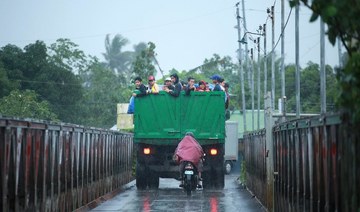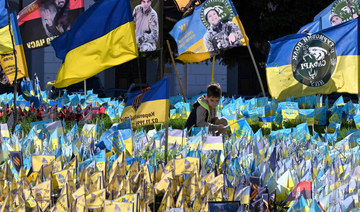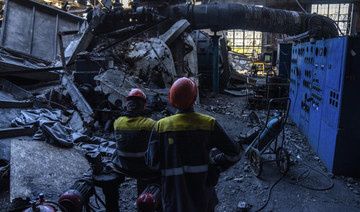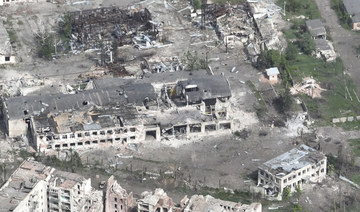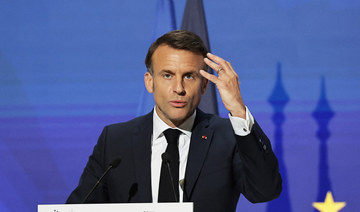MANILA: Eleven-year-old Jerry’s crime was breaking curfew laws after fleeing violence at home. His punishment? Being sent to a youth detention center, where he says he endured sexual abuse.
Officially called “Houses of Hope,” proponents in the Philippines say such facilities are places for reformation and education, but critics slam many of them as “hellholes” where children are treated like caged animals.
Rights’ groups say Jerry should never have been detained under current laws, but warn a proposed bill to lower the age of criminal responsibility from 15 to 12, will mean thousands more children will be sent to overcrowded and underfunded centers — leaving them vulnerable to mistreatment.
“I felt so dirty. That was the first time it happened to me,” Jerry told AFP as he recalled the night he was pulled from his bed, forced to the bathroom and attacked by older boys also held at a decaying center in Manila.
“I cannot forget the sexual abuse,” he explained, adding that he left home to escape beatings from his father and ended up sleeping on the streets. His mother works in Kuwait.
Under existing law, Houses of Hope are primarily to hold young offenders aged 15 to 18. But charities say younger vulnerable children from troubled homes, like Jerry, are sometimes swept up in the dragnet even for minor misdemeanours and struggle to recover from the experience.
Watchdogs and former wards warn planned legislation to criminalize children as young as 12 and then detain them with older teens and in some cases adults will put those least able to defend themselves at risk.
“There is a higher potential for abuse because the government is not prepared,” said Melanie Ramos-Llana of Child Rights Network Philippines.
“You put more children into Houses of Hope which are not equipped, lack personnel and programs, you will have problems. Jails or detention centers are not places for children,” she added.
Youth advocate Louise Suamen warns mixing youngsters who have committed minor infringements with older criminals could create a “school of crime.”
“If you are a child subjected to this environment, you can learn violence or abusive behavior. If they want to change something... treat detention as the last resort,” explained Suamen of Bahay Tuluyan Foundation.
A bill to give authorities the power to prosecute younger children stalled in the session of the legislature that wrapped up last month.
But it is a key plank of President Rodrigo Duterte’s tough-on-crime stance, which includes restoring the death penalty and his internationally condemned drug crackdown that has killed thousands since 2016.
After sweeping May’s midterm polls, Duterte allies dominate congress and have vowed to advance his agenda when the session opens on Monday.
But critics insist conditions in many of the facilities are identical to or worse than the jails adults are sent to.
“Children are detained in these so-called House of Hope like animals in cages,” said Father Shay Cullen, president of PREDA Foundation which helps boys like Jerry.
“These are really hellholes of subhuman conditions,” he added.
Five children previously held in the system, including Jerry, told AFP they suffered abuse in youth centers.
All the boys are identified using a pseudonym because they are minors or were when held.
Justin, who was 17 when he was brought to a youth center in the capital in 2017, said other boys beat him on the pretext he had broken house rules.
“They would punch us in the chest, stomach and sometimes the chin. It was so painful. I learned to be callous there because of what they did to me and I wanted revenge,” he said.
There are 55 government-run Houses of Hope nationwide, but this is well short of the 114 the Philippines has estimated it needs to properly house troubled juveniles.
According to official data only eight comply with social welfare rules.
These guidelines include having one social worker for every 25 children, providing one bed per resident along with nutritious meals, clothing, toiletries and rehabilitation programs.
“Some of the Houses of Hope we saw were worse than prisons. They have no programs,” Tricia Oco, executive director of the government’s Juvenile Justice and Welfare Council, told a senate inquiry in January.
Tristan, 15, was relieved when he was transferred to a House of Hope in Manila after being held in an adult jail on a drug trafficking charge he said police fabricated.
“I thought it would be a lovely home. But it was also a prison, a prison for children,” he told AFP.
The facilities where Jerry, Justin and Tristan stayed denied AFP’s requests for a visit.
The Department of Social Welfare and Development said it did not monitor peer abuse in centers, but institutions that failed to meet standards should be “held responsible.”
The Philippines raised the age of criminal responsibility from 9 to 15 in 2006, a move hailed as a step toward humane treatment.
However Duterte has repeatedly attacked the change as hampering police efforts to crack down on underage couriers for drug syndicates.
The gaps in the system stem from insufficient funding, weak congressional oversight and authorities’ preference for detention over community-based programs, advocates say.
“In reality detention becomes the first resort,” said Rowena Legaspi, executive director of the Children’s Legal Rights and Development Center.
The current law tasks provinces and cities with building and operating the centers but the national government monitors compliance.
Many Houses of Hope struggle with inadequate resources, said Jay Mark Chico, center head in northern Bulacan province.
His facility was built to accommodate 60 children but now houses 144 — squashed into rooms behind metal bars where some must sleep on the floor.
Chico told AFP the province had a daily food budget of 33 pesos (0.65 USD) per child but was pushing to increase this while building a bigger center to address overcrowding.
Still, there are some that say their time in the centers helped them.
“I am so grateful because I never imagined I could still pursue my studies,” said 21-year-old Nathan Andres, who was detained as a juvenile for rape but has been allowed to serve out his sentence in the Bulacan youth facility.
However Andres, who wants to become a teacher, says targeting 12-year-olds is not the answer.
He mused: “We are like the flowers we craft from old papers. People think we are garbage, useless. But actually we still have value.”
‘Worse than prison’: Abuses in Philippine youth homes
‘Worse than prison’: Abuses in Philippine youth homes
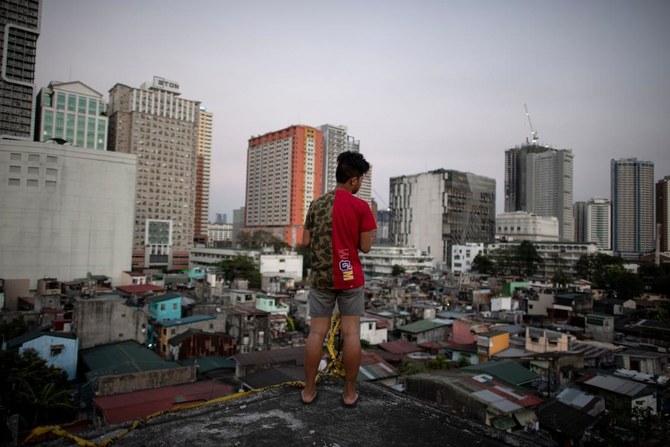
- Critics slam many of youth detention centers as “hellholes” where children are treated like caged animals
- A proposed bill will lower the age of criminal responsibility from 15 to 12
Russia’s FSB says it killed saboteur recruited by Ukraine

- The man was a Russian national recruited by Ukraine’s military intelligence to carry out the attack in the Leningrad region
- He had entered Russia from Lithuania in March after receiving training there
MOSCOW: Russia’s FSB state security service said on Friday its officers had killed a saboteur who had been recruited by Ukraine and was planning to attack a fuel terminal in northwestern Russia with explosives.
The FSB said in a statement the man was a Russian national recruited by Ukraine’s military intelligence to carry out the attack in the Leningrad region, and that he had been killed after shooting at security agents.
The FSB said he had entered Russia from Lithuania in March after receiving training there.
Vilmantas Vitkauskas, Head of the Lithuanian National Crisis Management Center, denied the allegation.
“Russia has been systematically conducting disinformation campaigns and provocations for a long time in order to raise tensions among societies and allies and to cover its aggressive actions,” he said.
“This disinformation spread by the FSB is a case in point. One of the objectives of such aggressive activities is to influence Lithuania’s support for Ukraine.”
There was no immediate comment by Ukraine, were Russian forces are waging war after Moscow’s full-scale invasion in February 2022.
Little hope of Ukraine breakthrough during Xi France visit: observers

- “France and the European Union expect him to use his influence on Russia, but Xi Jinping has nothing to offer on Ukraine,” said a former European diplomat
- Xi is due to make a state visit to France on Monday and Tuesday
PARIS: French President Emmanuel Macron will next week make a new push to try and dissuade China’s Xi Jinping from supporting Russian President Vladimir Putin’s war against Ukraine but is unlikely to make a breakthrough on ending the conflict during the visit, observers say.
President Xi’s visit is set to be rich on symbolism — with a sumptuous dinner at the Elysee Palace and a trip to the Pyrenees mountains planned — but risks being short on diplomatic success for the French leader.
“France and the European Union expect him to use his influence on Russia, but Xi Jinping has nothing to offer on Ukraine,” said a former European diplomat, asking not to be named.
Xi is due to make a state visit to France on Monday and Tuesday, followed by visits to Serbia and Hungary, two European countries retaining warm ties with Russia.
While Xi and Macron will discuss international crises, trade, climate change and cultural exchanges, the key aim will be to “point out that for Europe, the first issue with China is its position on Ukraine,” said a source close to the French government.
On a visit to China in 2023, Macron had already called on Xi to “bring Russia to its senses” over Ukraine and urged him not to deliver weapons to Moscow.
Little has changed, however. Xi will host Putin for talks in China later this month.
Macron, 46, indicated he had not given up on the idea of trying to get Xi, 70, on his side.
“It’s not in China’s interest today to have a Russia that destabilizes the international order,” the French president said in an interview with The Economist published on Thursday. “We need to work with China to build peace.”
European Commission President Ursula von der Leyen, who has urged Beijing to play a greater role in ending the Ukraine war, will join Macron and Xi for talks on Monday.
Macron has said he will ask the Chinese president to help him achieve that aim when he visits Paris, which is preparing to host the Olympic Games this summer.
There is a historic tradition that peace should reign during the Olympics — although the opening of the Games in Beijing in August 2008 did not halt Russia’s invasion of Georgia.
“On Ukraine, China has done nothing,” said Marc Julienne, director of the Center for Asian Studies at the French Institute of International Relations (IFRI).
In February 2023, China published a 12-point position paper on Ukraine, but it was rejected by Kyiv and its Western allies.
Beijing, which says it is a neutral party in the Ukraine conflict, has been criticized for refusing to condemn Moscow for its offensive.
The United States had accused China of helping Russia carry out its biggest militarization since Soviet times.
US officials say China has provided dual-use supplies that have let Russia regroup in the face of a long delay in US aid to Ukraine.
In April, US Secretary of State Antony Blinken said this included “machine tools, semiconductors, other dual-use items that have helped Russia rebuild the defense industrial base that sanctions and export controls had done so much to degrade.”
China has rejected the US claims as “groundless accusations.”
Macron, too, is expected to raise “concerns” about “the activity of certain Wuhan companies that could be directly involved in or contribute significantly to the Russian war effort,” according to a member of his team.
Beijing is a major supporter of the Russian economy.
China-Russia trade in 2023 reached a record $240 billion, according to customs data, overshooting a goal of $200 billion set by the neighbors.
Experts say Beijing is unlikely to renounce support for Moscow, which it sees as a priority partner in its opposition to the United States.
“Xi Jinping’s priority is the Global South,” said Emmanuel Lincot, a China expert at the Catholic University of Paris.
“There is a congruence in the Sino-Russian bilateral relationship, particularly in the desire to counter the West. Which is not to say that there is no rivalry.”
Human rights group begins legal action over UK’s Rwanda migrant policy

- The group said the government’s Safety of Rwanda policy document was inconsistent with the new law
LONDON: Human rights group Asylum Aid said on Friday it had launched a legal challenge to the British government’s policy of sending asylum seekers to Rwanda in the wake of a new law which seeks to pave the way for the scheme to be put into operation.
The group said the government’s Safety of Rwanda policy document, published on April 29, was inconsistent with the new law which was passed by parliament last month to override a ruling by the UK Supreme Court that the scheme was unlawful.
Britain sanctions Israeli groups, individuals for violence in West Bank

- The four individuals sanctioned were responsible for human rights abuses against Palestinian communities in the West Bank
LONDON: Britain on Friday imposed sanctions on two “extremist” groups and four individuals in Israel who it blamed for violence in the West Bank, its latest package of measures against Israeli settlers.
Britain’s Foreign Office named Hilltop Youth and Lehava as two groups which it said were known to have supported, incited and promoted violence against Palestinian communities in the West Bank.
The four individuals sanctioned were responsible for human rights abuses against these communities, the statement added.
Among them are Noam Federman, who has trained settler groups in committing violence and Elisha Yered, who has justified killing Palestinians on religious grounds.
Violence in the West Bank was already on the rise before Israel’s assault on Gaza, which was triggered by an Oct. 7 Hamas-led attack on southern Israel.
It has escalated since, with stepped-up Israeli military raids, settler violence and Palestinian street attacks.
British foreign minister David Cameron said extremist settlers were undermining security and stability and threatening the prospects for peace.
“The Israeli authorities must clamp down on those responsible. The UK will not hesitate to take further action if needed, including through further sanctions,” he said.
Those sanctioned will be subject to financial and travel restrictions. Britain previously imposed sanctions on four Israeli nationals in February.
Universities take steps to prevent pro-Palestinian protest disruptions of graduation ceremonies
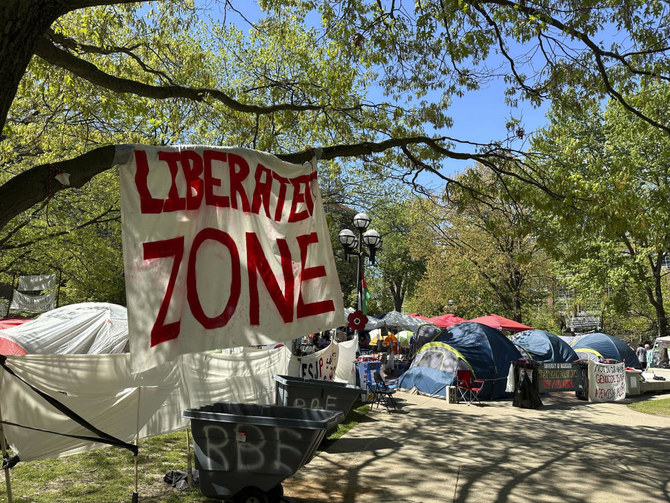
- Students booed and yelled “free Palestine” while the University of Utah president spoke Thursday night at commencement
- “People can exercise their First Amendment rights without disrupting or creating fear,” Burdick said of protesters
MICHIGAN, USA: With student protests over the Israel-Hamas war disrupting campuses nationwide, several major universities are intent on ensuring that commencement ceremonies — joyous milestones for graduates, their families and friends — go off without a hitch this weekend.
It won’t be easy. Colleges are hiring extra security, screening attendees at venues and emphasizing that significant disruptions by pro-Palestinian protesters won’t be tolerated. At the same time, they’re pledging to honor free-speech rights by designating protest zones.
Students booed and yelled “free Palestine” while the University of Utah president spoke Thursday night at commencement. He paused his speech to ask those who were protesting to leave or be removed. Outside the ceremony in Salt Lake City, a group of about 50 people were rallying. There was one arrest.
“Milestone is a perfect word,” said Ken Burdick of Tampa, Florida, describing his daughter’s graduation Saturday at the University of Michigan. He hopes the big day goes untarnished.
“People can exercise their First Amendment rights without disrupting or creating fear,” Burdick said of protesters.
Here’s how some schools are planning to balance things:
UNIVERSITY OF MICHIGAN
More than 8,000 graduates — and 63,000 spectators — are expected for Saturday’s festivities inside Michigan Stadium, known as The Big House. There will be security screening, and disruptive protesters could be subject to removal. Public safety officers and staff who commonly monitor major events, such as fall football games, will be present. Author and historian Brad Meltzer is the featured speaker.
In March, an annual event recognizing students with high academic achievement ended early when pro-Palestinian protesters raised provocative signs and drowned out remarks by President Santa Ono, yelling, “You are funding genocide!” The university subsequently drafted a policy that could lead to student expulsions and staff dismissals for event disruptions, though it hasn’t been finalized.
“It was painful for everyone who had gathered — and especially so for members of our Jewish community,” Ono said two days later.
Protesters have erected dozens of tents on the Diag, a historic space for campus activism more than a mile away from the stadium. They’re demanding that Michigan cut financial ties with companies connected to Israel. There has been no effort to break up the encampment and no arrests.
“We respect and uphold the principles of free expression, and also recognize that no one is entitled to disrupt university activities,” Laurie McCauley, Michigan’s chief academic officer, said in an email to students and staff about commencement.
Blake Richards, 25, is earning a bachelor’s degree in biochemistry. Richards plans to be at the football stadium Saturday after participating in a smaller ceremony Thursday for chemistry students.
“It could take away some great feelings, muddle them,” Richards said of any disruptions. “But truth be told, I’m not bothered. I know others have different opinions; I’m just happy to be here.”
INDIANA UNIVERSITY
The Bloomington, Indiana, campus is designating protest zones outside Skjodt Assembly Hall and Memorial Stadium, where ceremonies will be held Friday for graduate students and Saturday for undergraduates. Nearly 10,000 students are eligible to attend.
A social media post circulating on Instagram urged protesters to wear “your keffiyeh along with your cap and gown” and walk out during Saturday’s remarks by President Pamela Whitten.
Roughly 20 tents set up by protesters remained in place this week in an area known as Dunn Meadow, a mile from the stadium. Dozens of protesters have been arrested there recently, according to the Indiana Daily Student.
Maya Wasserman, a 22-year-old senior in management who is Jewish, said she and her family feel uncomfortable about the prospect of pro-Palestinian protests disrupting commencement. She expressed special concern for her mother and grandmother, who are Israeli.
“It’s unfortunate because we want this event to be about graduating, not politics,” Wasserman said.
At Dunn Meadow, students in lawn chairs or on blankets worked on their final assignments. Jessica Missey, a 20-year-old protester and senior, said she boycotted final exams; some professors, she said, simply canceled them. She has enjoyed the camaraderie at the encampment.
“Commencement is kind of just taking almost a little sidestep for me,” said Missey.
NORTHEASTERN UNIVERSITY
A week after police arrested nearly 100 protesters at Northeastern University, the school is holding its commencement exercises Sunday at Fenway Park, home of the Boston Red Sox, for the fourth consecutive year.
The venue will help security officials monitor the crowd and limit what people can bring. Signs, banners, balloons and full-size flags are prohibited in the stadium, along with most bags. Renata Nyul, vice president for communications, said public safety staffing will be strengthened.
All those entering Fenway will need to pass through metal detectors. About 50,000 graduates, family and friends are expected.
Northeastern is one of several universities in the Boston area that have had pro-Palestinian encampments. Some have let the protests continue, though Northeastern’s camp was broken up.
“While we realize that issues in the world prompt passionate viewpoints, the focus this weekend should be on our graduates and their remarkable achievements,” Nyul said.




